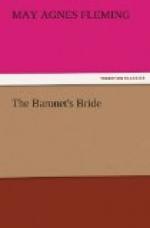“And all these years he has kept this,” she said, between her set teeth, “while he pretended he loved only me! ‘My peerless Zenith!’ Yes, she is beautiful as the fabled houris of the Mussulman’s paradise. Well, I will keep it in my turn. Who knows what end it may serve yet?”
She picked up the tress of hair, and enveloped all in the silver paper once more. Then she lifted the folded document, and looked darkly at the superscription:
“Horoscope of the Heir of Kingsland.”
“Which the heir of Kingsland shall never see,” she said, grimly unfolding it. “Now for this mighty secret.”
She just glanced at the mystic symbols, the cabalistic signs and figures, and turned to the other side. There, beautifully written, in long, clear letters, she saw her son’s fate.
The morning wore on—noon came; the house was as still as a tomb. Rosine, my lady’s maid, with a cup of tea, ventured to tap at her ladyship’s door. There was no response.
“She sleeps,” thought Rosine, and turned the handle.
But at the threshold she paused in wild alarm. No, my lady did not sleep. She sat in her chair, upright and ghastly as a galvanized corpse, a written paper closely clutched in her hand, and a look of white horror frozen on her face.
CHAPTER VII.
AFTER TEN YEARS.
“I have said it, and I mean it; they ought to know me well enough by this time, Godsoe. I’d transport every man of them, the poaching scoundrels, if I could! Tell that villain Dick Darkly that the first time I catch him at his old tricks he shall follow the brother he makes such a howling about, and share his fate.”
Sir Everard Kingsland was the speaker. He stood with one hand, white and shapely as a lady’s, resting on the glossy neck of his bay horse, his fair, handsome face, flushed with anger, turned upon his gamekeeper.
Peter Godsoe, the sturdy gamekeeper, standing before his young master, hat in hand, looked up deprecatingly.
“He takes it very hard, Sir Everard, that you sent his brother to Worrel Jail. His missis was sick, and two of the children had the measles, and Will Darkly he’d been out o’ work, and they was poor as poor. So he turns to and snares the rabbits, and—”
“Godsoe, are you trying to excuse this convicted poacher? Is that what you stopped me here to say?”
“I beg your pardon, Sir Everard; I only wanted to warn you—to put you on your guard—”
“To warn me—to put me on my guard? What do you mean? Has that villainous poacher dared to threaten me?”
“Not in my hearing, sir; but others say so. And he’s a dark, vindictive brute; and he swore a solemn oath, they say, when his brother went to Worrel Jail, to be revenged upon you. And so, Sir Everard, begging your pardon for the freedom, I thought as how you was likely to be out late to-night, coming home from my lord’s, and as Brithlow Wood is lonesome and dark—”




